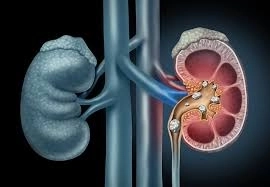
Causes of Recurrent Kidney Stones and How to Prevent Them Advice from Dr. Mohamed Mohsen
Published on: 2025-06-29 | Written by: Dr. Mohamed Mohsen Consultant Urologist
Dr. Mohamed Mohsen, Consultant in Urology, Andrology, and Endoscopy Surgery, Fellow of MPUH-Nadiad (India), Member of the European Association of Urology (EAU), and Head of the Urology Department at the Police Hospital, explains the main causes behind recurrent kidney stones and offers practical prevention tips using the latest non-surgical treatment methods.
What Are Kidney Stones?
Kidney stones are hard mineral deposits that form inside the kidneys due to the accumulation of salts and minerals. These stones vary in size and composition. They can cause intense flank or back pain, and recurrence is a medical challenge that requires accurate diagnosis and continuous monitoring.
What Causes Recurrent Kidney Stones?
Dr. Mohamed Mohsen emphasizes that recurrence is often due to a combination of factors, including:
1. Insufficient Water Intake
Low fluid consumption leads to concentrated urine, which promotes crystal formation.
2. Diet High in Salt and Animal Protein
Consuming large amounts of red meat, salt, or processed foods increases the risk, especially for calcium or uric acid stones.
3. Genetic Predisposition
Some people are genetically prone to stone formation, especially with a family history of kidney stones.
4. Urinary Tract Abnormalities
Conditions such as obstructions or reflux may hinder urine flow, promoting stone formation.
5. Chronic Medical Conditions
Diseases like gout or parathyroid disorders raise urine concentrations of certain substances, increasing the risk of recurrent stones.
How Does Dr. Mohamed Mohsen Assess Recurrent Stone Cases?
Dr. Mohamed Mohsen follows a detailed evaluation protocol that includes:
-
Comprehensive urine analysis and culture
-
Blood tests to assess calcium and uric acid levels
-
Ultrasound or CT scans for precise stone localization
-
Stone composition analysis (when available) to identify the root cause
Dr. Mohamed Mohsen’s Tips to Prevent Stone Recurrence:
-
Drink 2.5 to 3 liters of water daily
To ensure optimal urine flow and flush out excess salts -
Reduce salt and animal protein intake
Especially for patients with calcium or uric acid stones -
Eat water-rich vegetables like cucumber and watermelon
And limit oxalate-rich foods like spinach -
Exercise regularly
To boost kidney function and blood circulation -
Schedule regular follow-ups
Particularly after each episode to develop a personalized prevention plan
When Is Endoscopy or Laser Treatment Needed?
Dr. Mohamed Mohsen notes that large or recurrent stones may require non-surgical interventions using flexible endoscopy or laser lithotripsy. These are safe, modern solutions that reduce the chance of recurrence and preserve kidney function.

